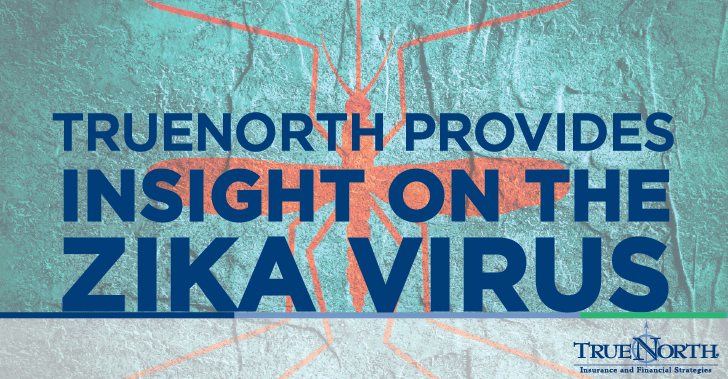Insight on the Zika Virus
posted by TrueNorth Employee Benefits on Tuesday, May 31, 2016

Named after the Ugandan forest where it was first discovered, the Zika virus is a mosquito-transmitted infection. Unlike other mosquito-transmitted infections, there is currently no vaccination to prevent or treat the Zika virus. Though becoming severely ill from the Zika virus is rare, it is important to know the facts and how to protect yourself from the virus.
Risk Factors
Anyone who is living in or traveling to an area where the Zika virus is found is at risk for infection. Because health experts are investigating the link between Zika and the spike in infants born with microcephaly (a neurological condition in which an infant's brain does not grow properly and results in an abnormally small head size), the Centers for Disease Control (CDC) has issued travel alerts advising women who are pregnant or could be pregnant against traveling.
The list of affected countries is ever-changing, but the following link provides the most updated information: www.cdc.gov/zika/geo/active-countries.html.
Symptoms
Approximately 1 out of every 5 individuals infected with the Zika virus will exhibit symptoms. These symptoms are typically mild in nature and last between a few days to a week. The most common symptoms include:
- Fever
- Rash
- Joint pain
- Conjunctivitis (pink eye)
- Muscle pain
- Headache
The Zika virus has been linked to microcephaly and Guillain-Barre syndrome, an extremely rare condition in which a person's own immune system damages the nerve cells, causing a muscle weakness and sometimes paralysis. In most cases, the Zika virus usually remains in the blood of an infected person for about a week, but it can be found longer in some people.
Prevention
The best way to avoid infection is to avoid traveling to areas that are experiencing Zika virus outbreaks. Also, the following is a list of steps you can take to help control mosquitoes and decrease your chances of being bitten:
- Wear long-sleeved shirts and pants when going into mosquito-infested areas, especially during the day, when the mosquito that carries the Zika virus is most active.
- Mosquitoes breed and multiply in standing water. Eliminate standing water in your yard. This includes unclogging of roof gutters, changing the water in birdbaths and emptying unused swimming pools.
- Use insect repellents that are registered with the Environmental Protection Agency (EPA) and be sure to follow the label's instructions. If you are also using sunscreen, apply sunscreen before applying inspect repellent. Do not use insect repellent on babies younger than 2 months old.
- Treat clothing and gear with permethrin or purchase permethrin-treated items. Do not apply permethrin directly to the skin.
- Mosquitoes can live indoors and will bite at any time, day or night. Use air conditioning to cool off your home and be sure that screens are on all windows and doors, especially if you often leave them open.
Global health experts are actively studying the Zika virus and are hopeful that medical breakthroughs regarding a vaccination will be made soon. To learn more about what the CDC is doing to reduce and prevent Zika outbreaks, click here.
About Author
TrueNorth offers businesses of every size comprehensive solutions to meet their business needs and those of their employees. If you are in need of business solutions and are looking for ways to protect and maximize your workforce, look to TrueNorth. Our Employee Benefits Division can assist you in providing for the well-being of both you and your staff. Call us today at 1-800-798-4080.
... read more about author